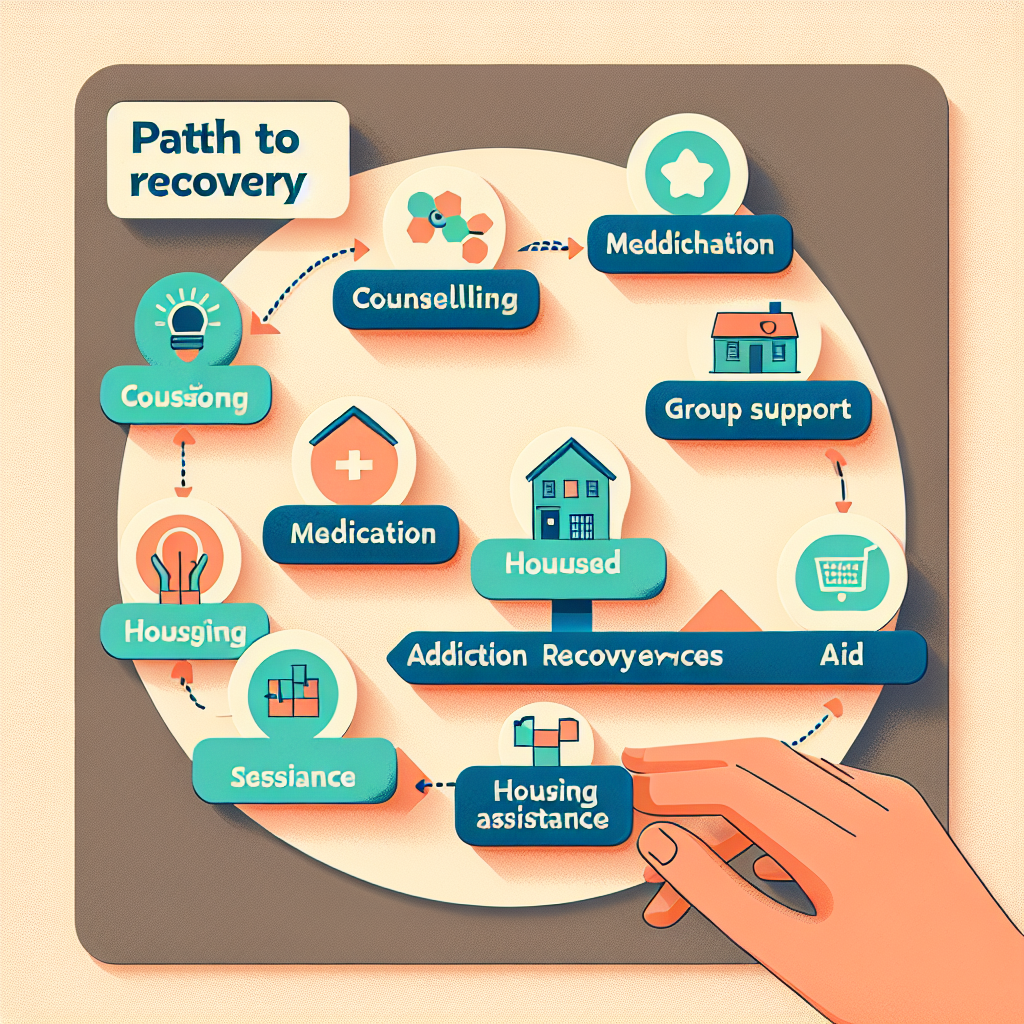-
Table of Contents

“Empowering Recovery: Bridging the Gap Between Sobriety and Secure Housing”
Introduction
Addiction recovery services can play a crucial role in addressing housing needs for individuals struggling with substance use disorders. These services often extend beyond mere treatment of addiction, encompassing a holistic approach that includes support for stable housing. Stable housing is a fundamental component of successful recovery, as it provides a safe and supportive environment that is conducive to healing and long-term sobriety. Many recovery programs collaborate with housing organizations, offer transitional living arrangements, or provide resources and referrals to help individuals secure permanent housing. By integrating housing support into addiction recovery plans, these services help to reduce the risk of relapse, promote overall well-being, and facilitate a smoother transition back into society.
How Addiction Recovery Services Can Support Housing Stability
Addiction recovery services play a crucial role in helping individuals regain control over their lives, but their impact extends far beyond just addressing substance use disorders. One of the most significant ways these services can support individuals is by helping them achieve housing stability. The journey to recovery is often fraught with numerous challenges, and securing stable housing is a critical component that can significantly influence the success of long-term recovery. By integrating housing support into addiction recovery programs, these services can provide a more holistic approach to healing and rebuilding lives.
Firstly, it is essential to recognize that addiction and homelessness are often intertwined. Many individuals struggling with substance use disorders find themselves without a stable place to live, which can exacerbate their addiction and make recovery even more difficult. Without a safe and stable environment, it becomes nearly impossible to focus on recovery. Addiction recovery services that include housing support can break this vicious cycle by providing individuals with a secure place to live, thereby creating a foundation upon which they can build their recovery.
Moreover, housing stability can significantly reduce the stress and anxiety that often accompany addiction. When individuals have a safe place to call home, they can focus more on their recovery journey rather than worrying about where they will sleep each night. This sense of security can lead to better mental health outcomes, which are crucial for successful recovery. Addiction recovery services that offer housing support can help individuals develop a sense of routine and normalcy, which is vital for maintaining sobriety.
In addition to providing a stable living environment, addiction recovery services can also offer various forms of support that are essential for maintaining housing stability. For instance, case management services can help individuals navigate the complex process of finding and securing housing. This may include assistance with filling out rental applications, negotiating with landlords, and accessing financial resources such as rental assistance programs. By providing this type of support, addiction recovery services can help individuals overcome the barriers that often prevent them from securing stable housing.
Furthermore, addiction recovery services can offer life skills training that is essential for maintaining housing stability. This may include budgeting and financial management, household maintenance, and conflict resolution skills. By equipping individuals with these essential skills, recovery services can help them become more self-sufficient and better prepared to maintain their housing in the long term. This type of support can be particularly beneficial for individuals who have been homeless for an extended period and may lack the skills necessary to manage a household.
Another critical aspect of housing support in addiction recovery is the creation of a supportive community. Many recovery programs offer transitional housing or sober living environments where individuals can live with others who are also on the path to recovery. These supportive communities can provide a sense of belonging and camaraderie, which can be incredibly motivating and inspiring. Living in an environment where everyone is working towards similar goals can foster a sense of accountability and encouragement, which are essential for long-term recovery.
In conclusion, addiction recovery services that incorporate housing support can significantly enhance the chances of successful recovery by providing a stable and secure environment, reducing stress and anxiety, offering essential life skills training, and fostering a supportive community. By addressing the housing needs of individuals in recovery, these services can help create a solid foundation upon which individuals can rebuild their lives and achieve lasting sobriety. The integration of housing support into addiction recovery programs is not just beneficial; it is essential for creating a comprehensive and effective approach to recovery.
Integrating Housing Assistance into Addiction Recovery Programs
Addiction recovery is a multifaceted journey that often requires more than just medical treatment and counseling. For many individuals, the path to sobriety is intertwined with the need for stable housing. Without a secure place to live, the challenges of overcoming addiction can become insurmountable. Recognizing this, many addiction recovery services are now integrating housing assistance into their programs, providing a holistic approach that addresses both the physical and emotional needs of those in recovery.
The connection between housing stability and successful addiction recovery cannot be overstated. A stable living environment offers a sense of security and routine, which are crucial for individuals trying to rebuild their lives. When people have a safe place to call home, they are better able to focus on their recovery, attend therapy sessions, and adhere to treatment plans. Conversely, those who are homeless or living in unstable conditions are more likely to relapse, as the stress and uncertainty of their living situation can trigger substance use as a coping mechanism.
Integrating housing assistance into addiction recovery programs is not just about providing a roof over someone’s head; it is about creating an environment conducive to healing and growth. Many recovery programs now offer transitional housing, which serves as a bridge between inpatient treatment and independent living. These facilities often provide a supportive community where individuals can share their experiences and support each other in their recovery journey. Additionally, they offer access to resources such as job training, educational opportunities, and life skills workshops, which are essential for long-term success.
Moreover, the integration of housing assistance into addiction recovery services can significantly reduce the stigma associated with both homelessness and addiction. By addressing these issues simultaneously, recovery programs can help individuals regain their dignity and self-worth. This holistic approach sends a powerful message that recovery is not just about abstaining from substances but about rebuilding one’s life in a comprehensive and sustainable way.
The benefits of integrating housing assistance into addiction recovery programs extend beyond the individual to the community at large. Stable housing reduces the likelihood of criminal behavior and emergency room visits, which are often associated with homelessness and addiction. This, in turn, alleviates the burden on public services and creates a safer, healthier community. Furthermore, individuals who successfully complete recovery programs and secure stable housing are more likely to become productive members of society, contributing to the economy and fostering a sense of community.
While the integration of housing assistance into addiction recovery programs is a promising development, it is not without its challenges. Funding is often a significant barrier, as both addiction treatment and housing services require substantial financial resources. However, many organizations are finding innovative ways to overcome this obstacle, such as forming partnerships with local governments, non-profits, and private sector entities. These collaborations can pool resources and expertise, creating a more robust support system for individuals in recovery.
In conclusion, integrating housing assistance into addiction recovery programs is a vital step toward addressing the complex needs of individuals struggling with substance use disorders. By providing stable housing, these programs offer a foundation upon which individuals can build their new lives, free from the grip of addiction. This holistic approach not only benefits the individuals in recovery but also strengthens the community as a whole. As more organizations recognize the importance of this integration, the future looks brighter for those on the path to recovery, offering hope and inspiration to all who seek a better life.
Q&A
1. Can addiction recovery services assist with finding housing?
Yes, many addiction recovery services offer support in finding stable housing as part of their comprehensive recovery programs.
2. Do addiction recovery services provide financial assistance for housing?
Some addiction recovery services may provide financial assistance or connect individuals with resources and programs that offer housing support.
Conclusion
Addiction recovery services can significantly aid with housing needs by providing stable living environments, access to supportive housing programs, and resources for securing long-term housing. These services often collaborate with housing agencies to ensure individuals in recovery have a safe and supportive place to live, which is crucial for maintaining sobriety and overall well-being.



